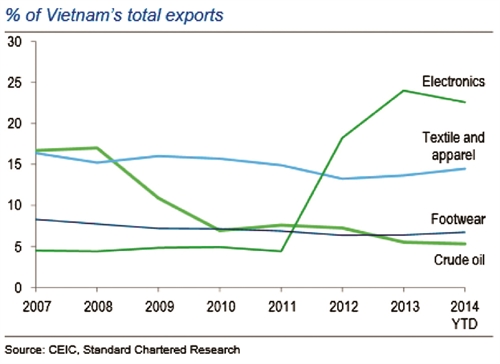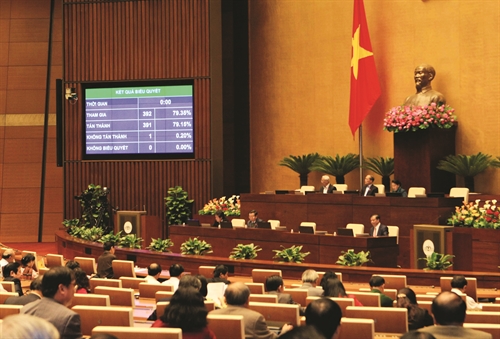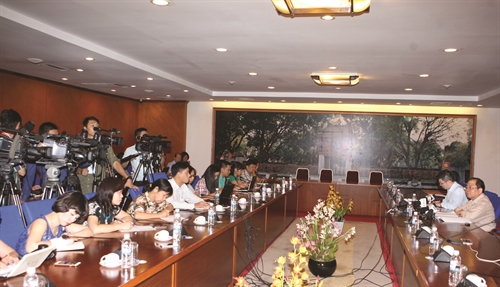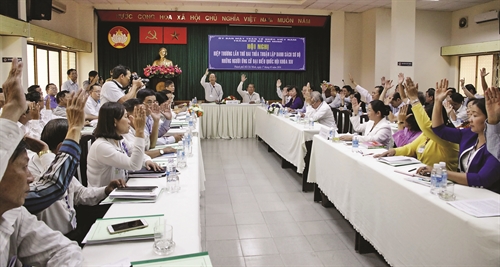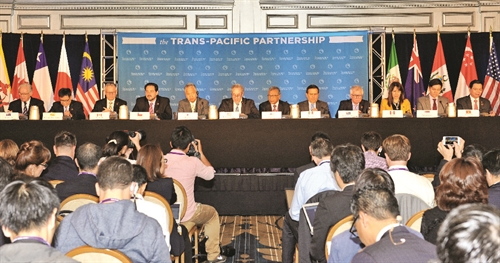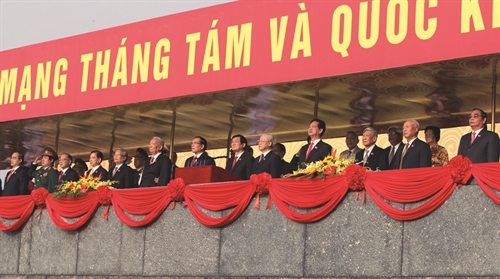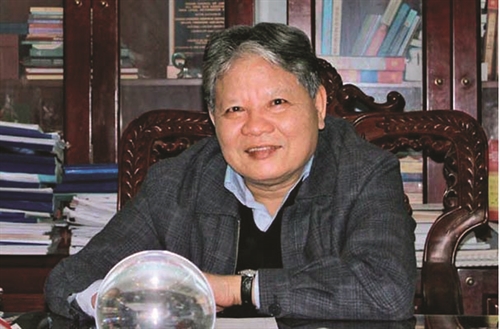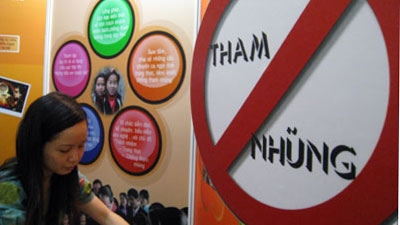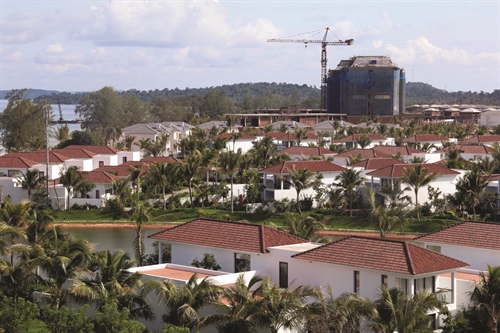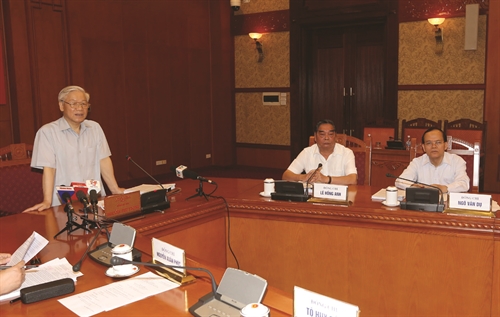Prime Minister Nguyen Tan Dung recently approved the Strategy for the country’s international integration through 2020, with a vision toward 2030, setting out the objectives, orientations and solutions to be implemented in economic, national defense and security and socio-cultural sectors.
According to the Strategy, the overall objectives of international integration through 2030 are to contribute to strengthening the country’s aggregate strength; take full advantage of favorable global conditions to soon turn Vietnam into a modern industrial country, improve people’s living standards; maintain independence, sovereignty, unity, and territorial integrity, and firmly defend the socialist Fatherland; and heighten the country’s position and prestige in the world.
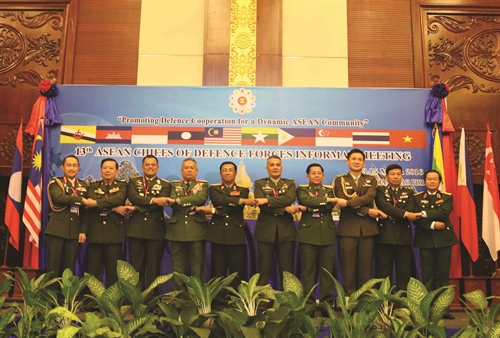 |
| Chief of the General Staff General Do Ba Ty (far right) and heads of delegations of the 13th ASEAN Chiefs of Defense Forces Informal Meeting (ACDFIM-13) on March 14, 2016, in Vientiane, Laos__Photo: Pham Kien/VNA |
Specific objectives set forth by the Strategy are to expand markets, take advantage of capital, technology, management knowledge; improve the competitiveness of the economy, businesses and products; foster the development of domestic industries, establish higher positions in the regional and international production and supply chains; actively make contributions to the process of transforming the growth model and restructuring the economy; beef up industrialization and modernization, enhance internal strength, reduce dependence on the outside, and narrow the development gap with ASEAN-6 countries. Regarding the degree of international integration, Vietnam strives to catch up with ASEAN-6 countries by 2020, ASEAN-4 countries by 2025, and to become one of the top ASEAN countries in such areas that the nation has strengths and have a catch-up strategy, including improvement of business environment, by 2030. In the short run, the country will successfully realize the socio-economic development targets that have been figured out.
International integration activities aim to consolidate and maintain a peaceful environment conducive to national development; heighten Vietnam’s position in the international arena and in relations with partners, especially major partners in the areas of national defense, security and development; make more effective contributions to the protection of sovereignty, unity and territorial integrity; firmly maintain political security, social order and safety, protect the regime, the Party and people; fruitfully exploit external resources in order to gradually modernize armed forces, strengthen the capacity of ensuring national security and defense. By 2030, Vietnam strives to become one of the key members that play a central role at security and defense cooperation mechanisms in the region; enhance the bonds of security and stability between Vietnam and the region.
The international integration process will actively contribute to the development of Vietnamese people to meet the requirements of the cause of industrialization, modernization and international integration. This process will absorb the world’s cultural values; preserve, promote and diffuse Vietnamese culture values; improve the image and people of Vietnam so that by 2030 the image of the nation would become popular around the world and Vietnam’s new contributions to the global culture will be recognized. The country will take full advantage of foreign resources to successfully realize strategic targets on labor, social security, education, training, healthcare, science and technology; attach special importance to improving workforce quality and science-technology capacity; create jobs and ensure rights of workers and vulnerable groups; push social justice, guarantee social security and improve its people’s material and spiritual lives.
Regarding international economic integration, the Strategy says the degree of international economic integration of Vietnam will equal the average degree of ASEAN-4 countries by 2030. International economic integration will be stepped up along with the process of increasing the connection among sectors, areas and regions in the country. Efforts will be focused on effective implementation of signed treaties, especially new-generation free trade agreements.
From now to 2030, the country will push ahead institutional improvement and administrative reform and continue implementing the Resolution of the 4th plenum of the Xth Party Central Committee on “Some major guidelines and policies for the economy to quickly and sustainably develop when Vietnam becomes a member of the World Trade Organization” in the new situation in association with implementing socio-economic development tasks under the Resolutions of the XIth and XIIth National Party Congresses.
The nation will incessantly improve the environment to attract foreign investment, associating investment attraction with implementation supervision to ensure economic security and economic-social-environmental effectiveness. It will speed up the process of restructuring public investment, encourage private investment and public-private partnership activities; increase the effective use of investment capital; and strictly control public debts, including foreign debts.
Connection among provinces, areas and regions will be promoted to bring into play the strengths of each locality. Localities will be encouraged and provide with conditions to proactively and actively join international integration. Connection among sectors will also be increased.
The country will effectively realize international economic commitments. A strategy for joining free trade regions with major economic-trade partners will be developed and implemented according to a suitable roadmap and in conformity with the interests and capacity of the country. Vietnam will proactively and actively join in making general rules and laws.
In the course of international integration, it is necessary to protect the legitimate interests of the State, businesses and Vietnamese customers in economic, commercial and international investment disputes.
Integration activities in the financial-monetary field will be carried out to meet the requirements and suit the level of development of the country, contributing to mobilizing financial source and consolidating the domestic financial-monetary system to be able to weather external impacts.
The Strategy also outlines a number of orientations for promoting political, defense and security integration.
In the coming years, Vietnam will intensify and deepen the relations with partners, especially those of strategic importance to the national development and security. It will bring substance to the established cooperation frameworks to intertwine the interests between the country and partners.
The nation will intensify and upgrade multilateral relations, proactively and actively participate in multilateral institutions, contributing to forming the playing rules and building an equitable and democratic political and economic order, preventing wars and conflicts, consolidating peace and stepping up win-win cooperation.
Vietnam will implement the strategy on defense and security integration in light of a new thinking about national defense and national security assurance. Efforts will be made to effectively make use of external resources and the country’s international position to serve the goal of firmly defending the Socialist Republic of Vietnam while facilitating international integration in the economic and other fields.
Proactive action will be taken to prevent, detect and frustrate all plots and activities of hostile forces taking advantage of international integration to infringe upon the national security and order.
Vietnam will proactively and positively participate in multilateral defense and security mechanisms in which Vietnam is a member, first and foremost mechanisms within the ASEAN framework and ASEAN-led mechanisms.
In the meantime, the country will make and implement a plan on participation in other multilateral mechanisms, including joining cooperation activities at higher levels such as peace keeping activities of the United Nations, combat of mass destruction weapons, joint military exercises and other activities, to meet the requirements of national defense and contribute to deepening relations with partners in a stable and sustainable manner.
For international integration in the fields of culture, society, ethnicity, education and training, science and technology, the Strategy says Vietnam will promote bilateral cooperation in these fields. The country will also promote multilateral cooperation, focusing on the building of the ASEAN Socio-Cultural Community.
It will realize its commitments and contribute to the modification, improvement and formulation of new standards and initiatives of international organizations of which Vietnam is a member, especially organizations within the United Nations system.
Particularly, Vietnam will actively participate in environmental cooperation institutions, making contributions to common efforts to manage and sustainably use resources and the environment, prevent and control natural disasters, respond to climate change, protect the environment, forests, water sources, fauna and flora in the country and in the world.- (VLLF)
